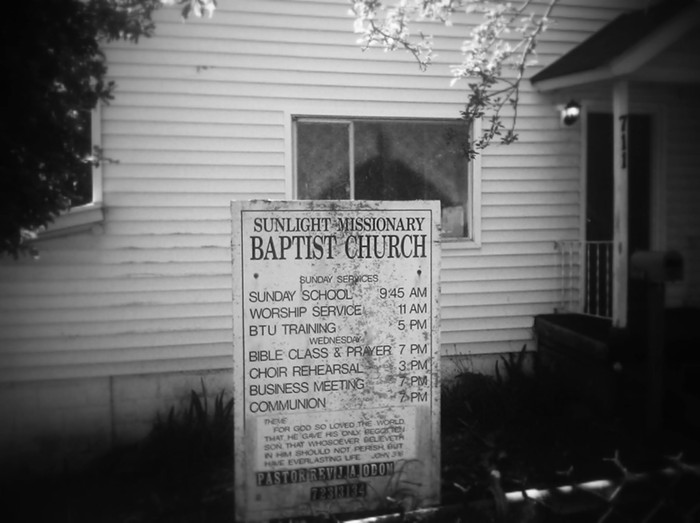
You'd be forgiven for not following the hot drama between "Access for All" advocates, the King County council's budget committee, and the quorum of Christian dads running the Seattle Times editorial board. But you'd be missing out on a conversation we all need to be having right now, one that affects the education of 285,000 students across the county, and also the quality of life for low-income families.
Here's what's going on.
Tuesday morning county council member Dave Upthegrove pulled Access for All from the budget committee agenda. The proposal is a .1 percent sales tax increase designed to support arts, science, and heritage education and access for King County.
You know what "education" means, but "access" means free or reduced price passes AND free bus transport for students to organizations such as the Pacific Science Center, the Woodland Park Zoo, the Seattle Symphony, etc., as well as serious pocket money for cultural institutions in the boonies and the suburbs of King County. Upthegrove's move effectively killed the proposal.
But then, Wednesday morning, a bunch of students, educators, and cultural organizations big and small packed the chamber in an effort to raise the proposal from dead. Due to the overwhelming support in the room, the committee allowed 25 people to testify to the fact that their lives have been meaningfully transformed by programs Access for All would allow to grow and proliferate.
The superintendent of the Kent School District, Dr. Calvin Watts, came out in support of the initiative, saying that the time for the bill is now. Referring to arguments he's heard about Access for All being a nice but unnecessary bill to pass, especially considering other serious challenges facing the county—homelessness, affordable housing, mental health funding—Watts claimed that “these issues aren’t separate" and said he believes "it’s inaccurate to refer to them as such."
One University of Washington student attributed her choice to pursue a degree in engineering to the The Museum of Flight's Washington Aerospace Scholars program, which she said gave her "access to invaluable education outside of the classroom through hands-on, project-based learning." Another young woman said her participation in Pacific Northwest Ballet's DanceChance gave her confidence and "changed [her] life for the better."
After the testimony, council members didn't decide to act one way or another, but they have until May 1 to vote to put the bill on the August ballot. If the measure goes on the ballot, and if it passes, Seattle would then provide the level of cultural access guaranteed to students and low-income families in glittering, progressive metropolises such as St. Louis and Denver, cities that have been operating similar programs for years.
Council chair Joe McDermott and council members Jeanne Kohl-Welles and Claudia Balducci, all of whom support the proposal, said in a statement that they "look forward to working with [their] colleagues to improve the proposal and find a path forward."
That forward movement involves adding amendments to the bill to ensure "geographical equity," Kohl-Welles said over the phone.
Under the current proposal (get ready to be a little bored, unless numbers stimulate you, that is!), about $30 million goes to large regional organizations such as the Woodland Park Zoo and the Museum of Flight, $22 million goes to community-based cultural organizations such as the Holocaust Center for Humanity and Youth Theatre Northwest, and $14.5 million goes to public school access programs. Half of that public school money provides free transportation to arts organizations, and the other half supports efforts by regional organizations to provide curriculum-based lessons that basically supplement education kids aren't getting because the state of Washington is unconstitutionally underfunding public schools against all reason.
Some council members want to make sure that funds are fairly distributed throughout the county's nine districts, so they're considering guaranteeing a minimum amount of funds for each district, allowing seed money for people who want to start up cultural organizations (music training programs, history museums, things like that) in more sparsely populated areas, requiring big ol' regional organizations (Seattle Symphony, the Seattle Repertory Theatre, 5th Ave Theatre, etc.) to spend 10 percent of their money outside the city of Seattle, either to create satellite branches of those orgs further out in the county or to increase the amount they spend on education programs in schools.
Council members also want to strengthen reporting requirements and enforcement for 4Culture, the arts administration org charged with overseeing the funding. If Access for All isn't helping underserved communities and school districts (i.e. those with the highest percentage of free or reduced lunch programs), then 4Culture will force the organizations to adjust their programming accordingly.
All of those amendments sound good and reasonable and meaningful, unlike objections to the proposal, which have recently been raised by Seattle's paper of record.
In an op-ed published last month, the Times' editorial board limits the scope of Access for All by referring to it only as an "arts" proposal, dismisses the massive investment in the county's culture and education as merely "fine," then claims that now is not the right time for it because we need to focus on homelessness and mental health, and, finally, disingenuously bemoans the fact that the tax is regressive.
I've already debunked many of these claims in an earlier post, but let me quickly remind people who haven't been following along what the relevant counterarguments are, and also provide some evidence as to why we need to be "having this conversation" in the first place.
1. Washington State has arguably the most regressive tax structure in the country. Because we have no statewide income tax, our only choice is to impose regressive taxes on ourselves. If the Times is really so concerned about passing regressive taxes, they should have endorsed the progressive state income tax when they had the chance.
2. The Times must stop making the argument that the county cannot address multiple issues at one time. We can support arts, science, and cultural education and access while we tackle affordable housing, the homelessness crisis, and inadequate mental health funding.
In fact, we sort of are. The renewal of the Veterans and Human Services levy, which may include improvements designed to "increase access to behavioral health services" for "low-income seniors, veterans, and adults" as well as increase housing for the homeless will be on the 2017 November ballot.
King County Executive Dow Constantine and Mayor Ed Murray are also pushing for a .1 percent sales tax to fund affordable housing and mental health to go on the ballot sometime in 2018.
But still you might think, as the Times thinks, that now is the wrong time for this kind of proposal. Why propose an "arts" bill before you propose a mental health and housing levy? I mean, what would housing and homelessness advocates say about this!?
Alison Eisinger at Seattle/King County Coalition on Homelessness says "we have an enormous, pressing need" to address the homelessness crisis. Making the Veterans levy as robust as it can be will help that project tremendously. As for the .1 percent sales tax, they're not particularly pushing for it to go on the August ballot, but they're not particularly pushing for it to go on the November 2018 ballot, either. They're pushing for Olympia to pass Substitute House Bill 1797, which will give King County council to implement the tax right now. And "they," by the way, includes King County Alliance for Human Services, Seattle Human Services Coalition, and Coalition Ending Gender-Based Violence.
3. The argument I did not fully address in my previous article on this proposal relates to sentiment the Times' editorial board espouses when it calls the proposal "fine."
Framing county-wide support for arts, science, and heritage organizations as some kind of luxury, some nice but unnecessary thing, reveals a stunning amount of ignorance regarding the role those organizations play in the community, and the importance of those subjects in education as a whole.
People get that the "science" part of that equation is good. Science is the "S" in the all-important STEM curriculum that will prepare children for the jobs of the future. But what does access to "art" and "heritage" studies do for children? Luckily there's an entire field of pedagogy dedicated to researching the benefits of such "fine" forms of education.
Consider this study, which shows that “drama-integrated language arts instruction”—sort of like the programs Seattle Rep and Youth Theatre Northwest can provide for students—“not only increases language arts achievement, but math achievement as well.” Or look at this one, which argues that, when kids act out plays, their “reading achievement, reading readiness, and writing” skills increase.
This increase in performance in "more serious" classes like math and language arts applies to kids who don't like school, too.
When the Arts for Academic Achievement program was implemented in 37 schools across Minneapolis, not only did students gain “cognitive, social, and emotional skills as a result of the program,” but “students who were typically less-likely to participate in class were more likely to participate in arts integrated classes.” Those same students were also "more engaged in instruction and acquired learning and skills in non-arts content areas." The arts help students swallow subjects they otherwise would avoid, as anyone's younger self would tell them if they stopped and listened to it for half a second.
But what good does access to "heritage" or "cultural" education and organizations do for anyone? This is another way of asking, "Why would we want to teach kids accurate information about the horrors of the Holocaust, or bring them to the Wing Luke Museum or the Northwest African American Museum?" Sure, those places are "fine," but are the experiences they provide urgent? Are they necessary?
One recent Stanford study found that, especially among Hispanic boys, "a high school ethnic studies course examining the roles of race, nationality and culture on identity and experience boosted attendance and academic performance of students at risk of dropping out," writes Brooke Donald.
"The researchers found that students not only made gains in attendance and grades, they also increased the number of course credits they earned to graduate," she adds.
If you want all kids—especially the most disadvantaged—to do better in school, if you want all kids to find a path that may lead them away from the thousand paths to homelessness in the first place, and if you think low-income families deserve access to inspiring and life-giving cultural experiences, then it makes sense to invest in Access for All's ounce of prevention.
Tell the county council to put the proposal back on the agenda. Tell them to put it on the ballot. They have until May 1st.















